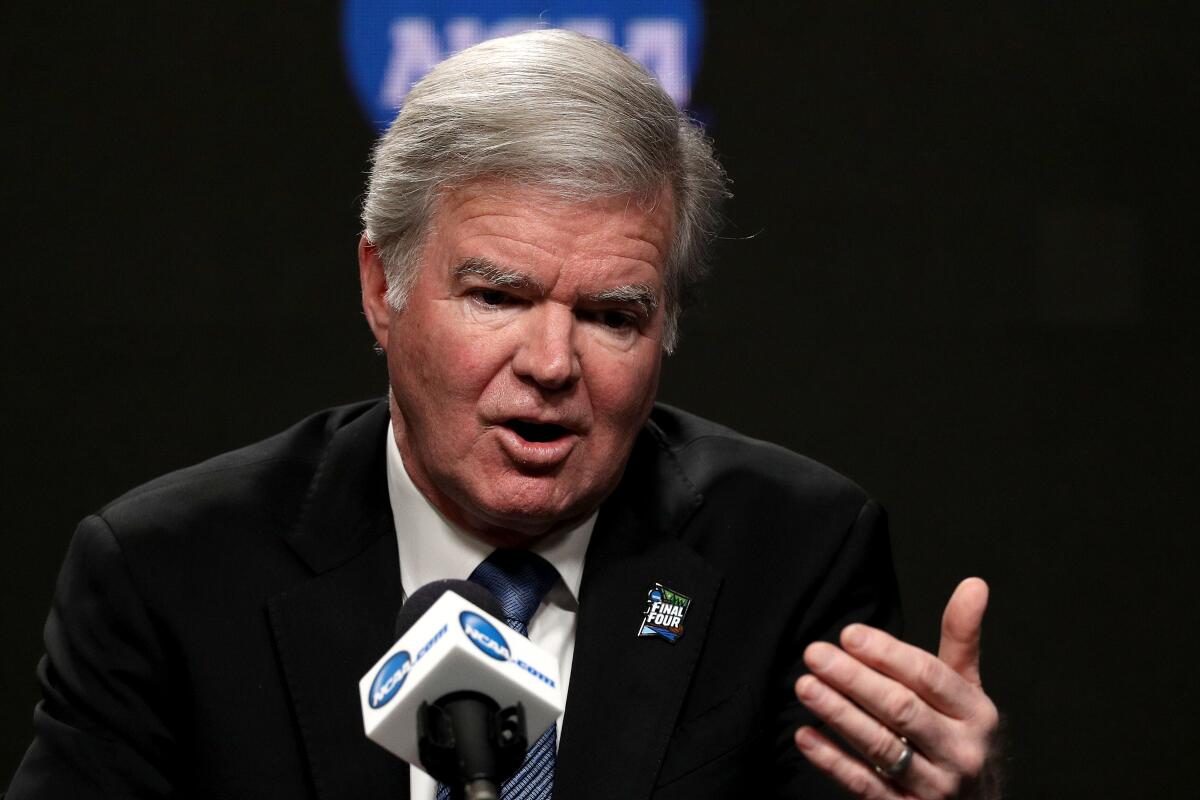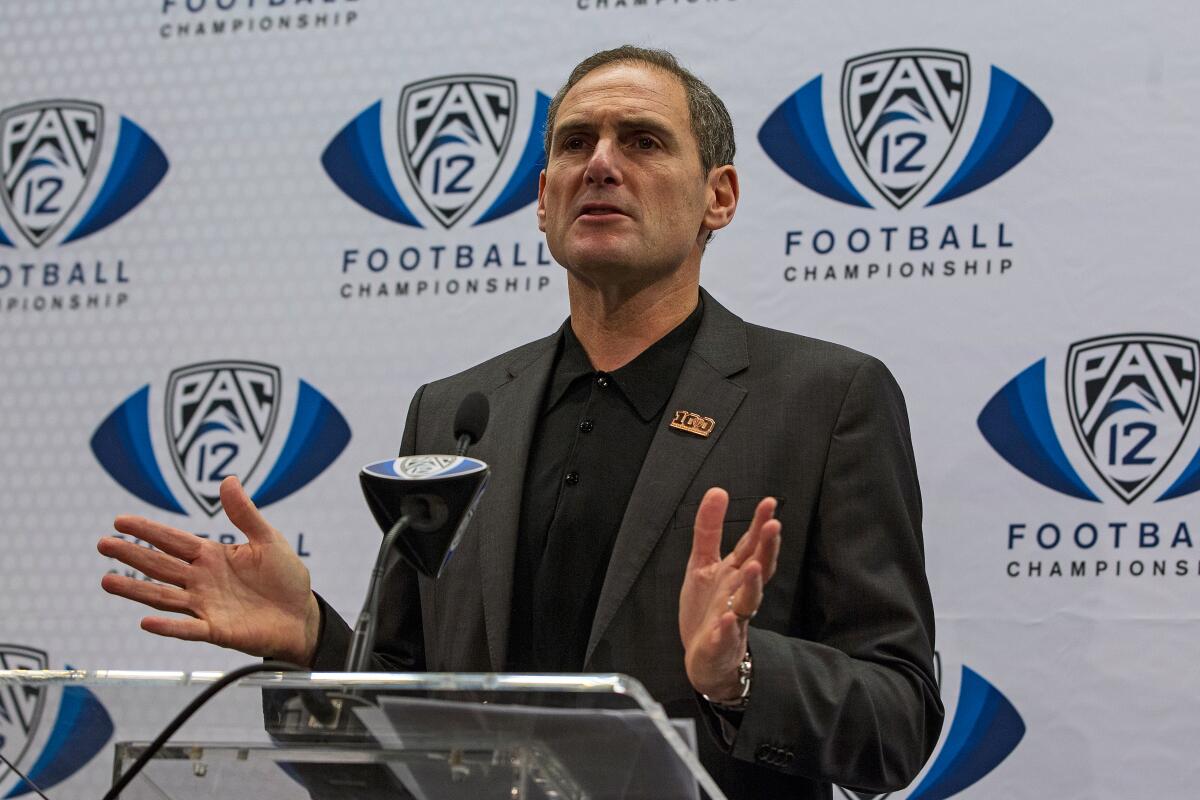With a signing by Governor Gavin Newsom Monday morningCalifornia has taken the lead on college athlete compensation with the approval of Senate Bill 206, which will allow athletes to profit from the use of their name, image and likeness starting in 2023 .
However, this same stroke of the pen raises even more questions.
The NCAA released a statement Monday showing that college sports’ governing body also doesn’t know what happens next.
“As a membership organization, the NCAA agrees that changes are necessary to continue to support student-athletes, but improvements must occur at the national level through the NCAA rulemaking process,” indicates the press release. “Unfortunately, this new law is already creating confusion for current and future student-athletes, coaches, administrators and campuses, and not just in California.”
The fact is that the bill is quite simple if one takes the time to read it instead of taking the headlines at face value or believing the NCAA’s previous tactics, which have called the bill “unconstitutional” or an existential threat. The relevant portion of the bill is approximately 700 words and does not threaten the future of college sports.
Here are key questions and answers about the law:
What does the bill do?

California college athletes will be allowed to supplement what schools offer them – tuition, room and board, as well as a stipend for any additional costs of attendance – with compensation from the use of their name, of their image and likeness (NIL). That means they can strike sponsorship deals with brands as big as Nike and as small as Joe’s Chevrolet dealership; they can be paid to run camps to teach their sport; and they can earn money by signing autographs. To do this, they will also be allowed to sign with an agent or hire an attorney to represent them.
NCAA amateurism rules currently prohibit all of the above.
But, thanks to this law, none of these actions will result in the athlete losing their scholarship or being unable to participate in their sport. None of these actions will result in the NCAA, conferences, or any other group or organization with authority over college sports preventing a school from participating because of an athlete’s compensation or use of their NIL.
How will the law affect college athletic department budgets?
It won’t, at least not intentionally.
If there’s one thing to understand about SB 206, it’s this: College athletic departments won’t have to spend an extra dime on athlete compensation because of this law.
In fact, the bill goes so far as to explicitly prohibit the NCAA, conferences, and schools from paying players for the use of their NILs — even though none of those entities would ever choose to do so.
“A postsecondary educational institution, athletic association, conference, or other group or organization having authority over intercollegiate athletics shall not provide a prospective student-athlete with compensation in connection with the name, likeness, or likeness of the athlete,” SB 206 states.
The senators who wrote and amended this bill did not make life more difficult for the number crunchers in college athletic departments. They did not address other NIL issues, such as the fact that players receive no cut of the hundreds of millions of dollars in media rights deals negotiated by schools and conferences. All of that coin stays in the school’s coffers, and schools can continue to pretend their athletes are students and not employees.
California universities have told the state legislature that the bill would have unintended financial consequences, such as having to add millions of dollars in compliance staff to police this new world of business. They also predicted they would have to pay NCAA fines of up to $5 million in total for their teams not to comply.
Will the law mean California schools will be kicked out of the NCAA or Pac-12?
USC, Stanford, the University of California system and the California State University schools all opposed SB 206 as it passed the Senate. These schools rightly fear retaliation from the NCAA in the form of not being able to compete in championships because California has a major recruiting advantage. This is likely to end up in court over whether it would constitute an antitrust violation by the NCAA.
But SB 206 should not be viewed as an existential threat to the ability of California colleges to play high-profile sports. This could pose an existential threat to the NCAA if the organization adapts too slowly.
Remember: Colleges don’t need the NCAA to continue playing sports and making hundreds of millions of dollars. The NCAA needs universities, and it especially needs California’s huge economy and massive television market share to help fuel its money-making engine.
How could the law affect recruiting in California schools?
Payments to players would come from third parties and, under SB 206, athletes would have to disclose them to schools. Much of the compensation awarded to athletes who go under the table – leading to investigations by the NCAA Committee on Infractions and various forms of sanctions when schools and athletes are caught – can now be brought before the court.
Joe from Joe’s Chevrolet will no longer have to give shoeboxes full of cash to his favorite player. Instead, he may employ them for an advertisement or an appearance at the dealership to sign memorabilia.
Athletic departments could be slightly impacted by SB 206 if donors choose to give their money directly to athletes through their businesses instead of donating to the school to help fund the inflated salaries of coaches and coaches. Sparkling new facilities that have more bells and whistles than many professional franchises offer. for their players.
What does this mean for the NCAA in the long term?
Courts have grappled with the NCAA’s amateurism rules over the past decade and, despite a California federal judge’s ruling in O’Bannon v. NCAA in 2014 that the organization’s NIL statutes constituted a violation of antitrust law, nothing has changed. flow of money into college sports.
Newsom signing SB 206 introduced a new battleground, one that should inject a lot more fear into the NCAA and schools.

Mark Emmert, president of the NCAA.
(Getty Images)
The NCAA has appointed a working committee to examine the NIL issue and is expected to release its findings in October. State lawmakers across the country will be paying attention.
“We will consider next steps in California as our members continue their efforts to make adjustments to the NCAA name, image and likeness rules that are both realistic in modern society and related to higher education “, the NCAA press release said.
“As more states consider their own specific legislation relating to this topic, it is clear that a patchwork of different laws emanating from different states will make the goal of providing a level playing field for 1,100 campuses and nearly half a million student-athletes nationwide.”
If the NCAA doesn’t back down and drastically change its NIL statutes — it’s unlikely to do so, at least this early in the game — then it risks California schools and universities located in like-minded states are looking for a new endgame: create a new governing body for college sports that oversees schools that allow athletes to take advantage of their NIL. The system would work similarly to the Olympic model of paying athletes.
Imagine if Washington, Oregon, Colorado, Utah and Arizona ended up passing similar legislation and the Pac-12 schools – desperate for national relevance in their current state – were disbanded from the NCAA? If other states didn’t follow, much of the best talent would end up on the West Coast, a migration the rest of the country wouldn’t support.
But no one should expect Pac-12 Commissioner Larry Scott to lead this revolution.

Pac-12 commissioner Larry Scott.
(Getty Images)
“The Pac-12 is disappointed by the passage of SB 206 and believes it will have very significant negative consequences for our student-athletes and broader California universities,” read a statement released Monday by the Pac-12. Pac-12. “This legislation will result in the professionalization of college sports and will result in many unintended consequences related to that professionalism. (It) imposes a state law that conflicts with national rules, will blur the lines in how California universities recruit student-athletes and compete nationally, and will likely reduce resources and opportunities for student-athletes in Olympic sports and will have a disparate negative impact on female student-athletes.
Over the next three years, such statements will continue from college sports decision-makers. On Monday, California cut through the noise.
The NCAA would be smart to avoid its own extinction, admit that its sports are at least semi-professional, and allow use of name, image and likeness.
With a ceiling, of course, because people don’t change overnight.

